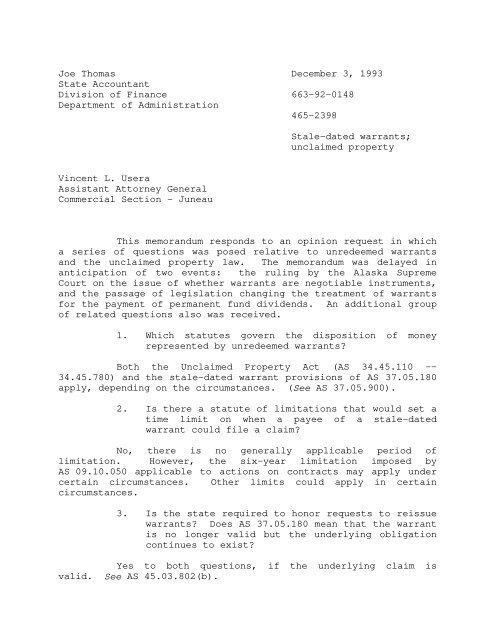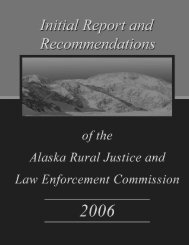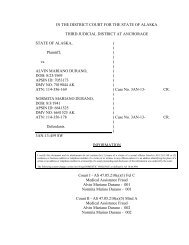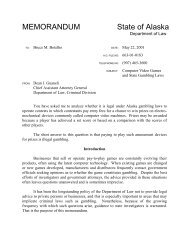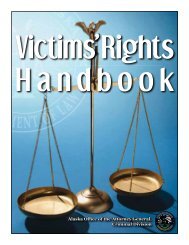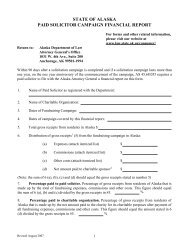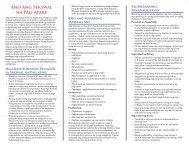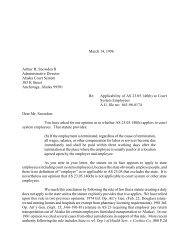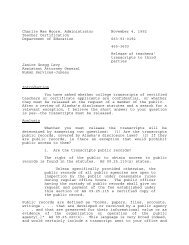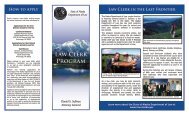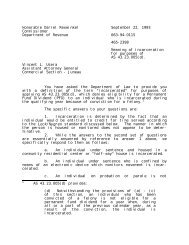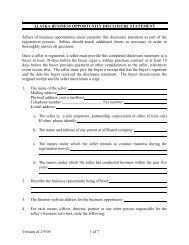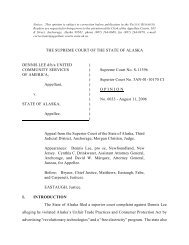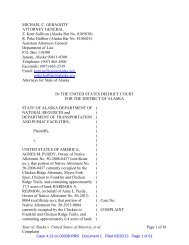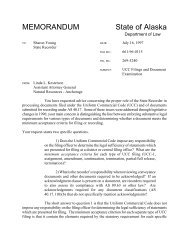Stale-dated warrants; unclaimed property - Alaska Department of Law
Stale-dated warrants; unclaimed property - Alaska Department of Law
Stale-dated warrants; unclaimed property - Alaska Department of Law
You also want an ePaper? Increase the reach of your titles
YUMPU automatically turns print PDFs into web optimized ePapers that Google loves.
Joe Thomas December 3, 1993<br />
State Accountant<br />
Division <strong>of</strong> Finance 663-92-0148<br />
<strong>Department</strong> <strong>of</strong> Administration<br />
465-2398<br />
<strong>Stale</strong>-<strong>dated</strong> <strong>warrants</strong>;<br />
<strong>unclaimed</strong> <strong>property</strong><br />
Vincent L. Usera<br />
Assistant Attorney General<br />
Commercial Section - Juneau<br />
This memorandum responds to an opinion request in which<br />
a series <strong>of</strong> questions was posed relative to unredeemed <strong>warrants</strong><br />
and the <strong>unclaimed</strong> <strong>property</strong> law. The memorandum was delayed in<br />
anticipation <strong>of</strong> two events: the ruling by the <strong>Alaska</strong> Supreme<br />
Court on the issue <strong>of</strong> whether <strong>warrants</strong> are negotiable instruments,<br />
and the passage <strong>of</strong> legislation changing the treatment <strong>of</strong> <strong>warrants</strong><br />
for the payment <strong>of</strong> permanent fund dividends. An additional group<br />
<strong>of</strong> related questions also was received.<br />
1. Which statutes govern the disposition <strong>of</strong> money<br />
represented by unredeemed <strong>warrants</strong>?<br />
Both the Unclaimed Property Act (AS 34.45.110 -<br />
34.45.780) and the stale-<strong>dated</strong> warrant provisions <strong>of</strong> AS 37.05.180<br />
apply, depending on the circumstances. (See AS 37.05.900).<br />
2. Is there a statute <strong>of</strong> limitations that would set a<br />
time limit on when a payee <strong>of</strong> a stale-<strong>dated</strong><br />
warrant could file a claim?<br />
No, there is no generally applicable period <strong>of</strong><br />
limitation. However, the six-year limitation imposed by<br />
AS 09.10.050 applicable to actions on contracts may apply under<br />
certain circumstances. Other limits could apply in certain<br />
circumstances.<br />
3. Is the state required to honor requests to reissue<br />
<strong>warrants</strong>? Does AS 37.05.180 mean that the warrant<br />
is no longer valid but the underlying obligation<br />
continues to exist?<br />
valid.<br />
Yes to both questions, if the underlying claim is<br />
See AS 45.03.802(b).
Joe Thomas, State Accountant December 3, 1993<br />
Division <strong>of</strong> Finance Page 2<br />
663-92-0148<br />
4. Could the state put money into a special liability<br />
account when a warrant becomes stale-<strong>dated</strong>?<br />
The money must go to the general fund except in certain<br />
enumerated instances, AS 37.05.180; 1 however, there does not<br />
appear to be any reason a special liability account within the<br />
general fund could not be established for ease <strong>of</strong> accounting.<br />
5. Can the state reissue a warrant in place <strong>of</strong> a<br />
stale-<strong>dated</strong> warrant to a party other than the<br />
original payee, such as a "fee finder" 2 with a<br />
power <strong>of</strong> attorney? What documentation should be<br />
required?<br />
Yes, <strong>warrants</strong> can be reissued to a third party with the<br />
clear authority to make a claim on behalf <strong>of</strong> the original payee.<br />
A valid power <strong>of</strong> attorney with specific authority would be<br />
sufficient, although not the exclusive means <strong>of</strong> granting such<br />
authority.<br />
1<br />
It may be helpful to explain what really happens in the<br />
course <strong>of</strong> a state payment. This is somewhat simplified but may<br />
explain the process sufficiently.<br />
The general fund contains all the money the state has<br />
for paying its bills. The legislature makes an appropriation, an<br />
authorization to use a certain amount to pay for certain matters.<br />
The state prepares a warrant to pay an obligation from the money<br />
appropriated; however, no money ever really leaves the fund. If<br />
the warrant is presented for payment, the state's paying bank<br />
gives the money to the payee and then presents the warrant for<br />
money to actually be withdrawn from the state treasury to<br />
"reimburse" itself.<br />
If the warrant is not presented for payment and becomes<br />
stale-<strong>dated</strong>, no money has to be returned to the fund, since none<br />
ever left. For that reason it is misleading to speak in terms <strong>of</strong><br />
"returning" or "transferring" monies to the general fund. All<br />
that really occurs is a paper accounting entry.<br />
2<br />
The term "fee finder" has been coined by the Division <strong>of</strong><br />
Finance to refer to entities that, for a fee or a share <strong>of</strong> the<br />
payment, locate unpaid monies, <strong>unclaimed</strong> funds, and the like, for<br />
third parties to whom these are due.
Joe Thomas, State Accountant December 3, 1993<br />
Division <strong>of</strong> Finance Page 3<br />
663-92-0148<br />
6. Can money representing unredeemed <strong>warrants</strong> issued<br />
from trust funds such as retirement funds,<br />
permanent fund dividend fund, and public guardian<br />
funds be returned to the fund from which the<br />
warrant was issued?<br />
Except for <strong>warrants</strong> representing permanent fund<br />
dividends, 3 monies represented by stale-<strong>dated</strong>/unredeemed <strong>warrants</strong><br />
must be returned to the general fund. 4<br />
7. Are there any restrictions on cancelling a warrant<br />
before it becomes stale-<strong>dated</strong>? Must there be a<br />
legal basis for cancelling a warrant earlier than<br />
the date it becomes stale-<strong>dated</strong>?<br />
A warrant, upon delivery 5 to the payee, is a contract 6<br />
and could only be cancelled if returned to the issuer for some<br />
reason, such as returned by the Postal Service as undeliverable,<br />
or perhaps returned by the payee because it is for the wrong<br />
amount. Cancelling a warrant before it becomes stale-<strong>dated</strong> would<br />
only be permissible if the underlying reason for payment becomes<br />
altered and if the warrant is returned to the issuer. Otherwise<br />
cancellation would be a breach <strong>of</strong> contract just as would be<br />
placing a stop payment order on a check without good cause.<br />
3<br />
An exclusion for permanent fund dividends was enacted by sec.<br />
3, ch. 4, SLA 1992.<br />
4<br />
We suggest that for ease <strong>of</strong> tracking such funds, some form <strong>of</strong><br />
separate accounting within the general fund be created to hold<br />
these funds. This would prevent their being "lost" from control<br />
for fiduciary purposes. See the answer to question 4.<br />
5<br />
Commercial paper (e.g., negotiable instruments) must be<br />
delivered to become binding on the issuer. See 5 Ronald A.<br />
Anderson, Uniform Commercial Code 3-101:22 and 3-102:7 (3d ed.<br />
1984); 11 Am. Jur. 2d Bills & Notes 270 (1963).<br />
6<br />
See Ronald A. Anderson, Uniform Commercial Code 3-101:22<br />
and 3-119:1 (quoting from Official Code Commentary n.3 (3d ed.<br />
1984)). See also Boyles Bros. Drilling Co. v. Orion Industries,<br />
Ltd., 761 P.2d 278 (Col. App. 1988) ("As between the parties a<br />
negotiable instrument . . . is merely a contract.")
Joe Thomas, State Accountant December 3, 1993<br />
Division <strong>of</strong> Finance Page 4<br />
663-92-0148<br />
8. Is the state prohibited by AS 34.45.700 from releasing<br />
information pertaining to stale-<strong>dated</strong> <strong>warrants</strong> or<br />
<strong>unclaimed</strong> <strong>property</strong> to "fee finders"?<br />
No. <strong>Alaska</strong> Statute 34.45.700 governs the enforceability<br />
<strong>of</strong> agreements to recover <strong>unclaimed</strong> <strong>property</strong> and affects the<br />
liability between the agent and the principal for whom recovery<br />
would be made. This section has no effect on whether information<br />
could or should be released. However, there are limitations on<br />
how much information may be released. See question 10 below.<br />
9. Is an agreement to locate <strong>unclaimed</strong> <strong>property</strong><br />
enforceable if made prior to the report required by AS<br />
34.45.280 or delivery <strong>of</strong> the <strong>property</strong> required by AS<br />
34.45.320?<br />
No. Any agreement to locate <strong>unclaimed</strong> <strong>property</strong> for a<br />
fee is not enforceable -- as between the intended finder and the<br />
person whom the finder acts -- if made within 24 months after the<br />
payment or delivery <strong>of</strong> the <strong>property</strong> required by AS 34.45.320. The<br />
date <strong>of</strong> making the report has no effect on enforceability, though<br />
it is likely that in most cases reporting would precede delivery<br />
or at least occur at the same time. The comments on this question<br />
refer to an organization that contacted the department asking for<br />
a list <strong>of</strong> outstanding <strong>warrants</strong>. The concern is that with this<br />
list, the "fee finder" could get an agreement in place prior to<br />
your department reporting or delivering <strong>unclaimed</strong> <strong>property</strong> to the<br />
<strong>Department</strong> <strong>of</strong> Revenue. Any agreement made within this scenario<br />
would be unenforceable; however, this unenforceability would not<br />
affect the <strong>Department</strong> <strong>of</strong> Revenue's obligation to pay a valid claim<br />
on <strong>unclaimed</strong> <strong>property</strong> under the Act. It would be incumbent on the<br />
person entitled to the <strong>property</strong> to exercise the unenforceability<br />
section.<br />
10. Are "fee finders" entitled to receive a listing <strong>of</strong><br />
the state's outstanding <strong>warrants</strong>?<br />
If such a list is routinely kept, yes. Under<br />
AS 09.25.110 all state records are open to inspection and copying<br />
unless an exception is provided for under AS 09.25.120 or a<br />
privilege can be claimed under state or common law. There is no<br />
exception for such a list, nor any privilege that might apply, and<br />
it must, therefore, be provided upon request. The types and<br />
amounts <strong>of</strong> information, however, may be limited. Although open<br />
records laws dictate the availability <strong>of</strong> virtually all government<br />
records to the public, privacy considerations may intervene to
Joe Thomas, State Accountant December 3, 1993<br />
Division <strong>of</strong> Finance Page 5<br />
663-92-0148<br />
prohibit dissemination <strong>of</strong> all the information maintained in those<br />
records. We believe you would be required to disclose the names,<br />
addresses, and telephone numbers, if available, to anyone seeking<br />
this information. The amount <strong>of</strong> money involved, however, should<br />
probably be expunged to comply with AS 44.99.350. 7<br />
11. Should the state advise "fee finders" who are given<br />
lists <strong>of</strong> outstanding <strong>warrants</strong> <strong>of</strong> the provisions <strong>of</strong><br />
AS 34.45.700?<br />
There is nothing prohibiting such advice; however,<br />
there is also no obligation to provide advice. All persons are<br />
presumed to know the law. Ostrosky v. State, 704 P.2d 786 (<strong>Alaska</strong><br />
App. 1985), appeal on remand, 725 P.2d 1087 (<strong>Alaska</strong> App. 1986).<br />
12. Should the state inform the original payee when placing<br />
a stop payment order on a warrant?<br />
Generally, yes, if it is reasonably possible to do so.<br />
A warrant does not become stale-<strong>dated</strong> until the passage <strong>of</strong> two<br />
years from the date <strong>of</strong> issuance. During that time, absent some<br />
overriding reason, payment on <strong>warrants</strong> cannot be stopped except at<br />
the request <strong>of</strong> the payee, but even in that case, also for good<br />
cause. (See answer to Question 7, above.) An individual may<br />
retain an unpaid warrant -- at his peril -- for whatever reason.<br />
The state may make no judgments about an unpaid warrant before the<br />
two-year stale-date period is ended. After that, because the<br />
warrant is considered to have been paid, it is cancelled and the<br />
monies it represented returned to the general fund. 8<br />
13. Can a payee hold a warrant for an extended period (even<br />
up to two years) without concern that a "fee finder"<br />
could make a claim for it?<br />
Yes. Except for payroll <strong>warrants</strong>, 9 no one can do<br />
7<br />
Although explored in another context, these concerns are<br />
directly addressed in 1992 Inf. Op. Att'y Gen. (Apr. 1; 663-92<br />
0163), a copy <strong>of</strong> which is attached.<br />
8<br />
It is returned to the general fund unless it may properly be<br />
returned to some other fund, in which case that would be the fund<br />
to which the monies would be credited.<br />
9<br />
Under AS 34.45.250, payroll <strong>warrants</strong> become abandoned<br />
<strong>property</strong> one year after issuance. This means that, even though
Joe Thomas, State Accountant December 3, 1993<br />
Division <strong>of</strong> Finance Page 6<br />
663-92-0148<br />
anything about making a claim for an unredeemed warrant until it<br />
becomes stale-<strong>dated</strong>, unless the payee asks for a stop-payment and<br />
reissuance <strong>of</strong> a substitute warrant, such as might occur if the<br />
payee knows the original warrant has been lost. Furthermore, the<br />
"fee finder" acting to secure a contract to locate <strong>unclaimed</strong><br />
<strong>property</strong> before an additional two years has passed could not<br />
enforce the contract. (See the answer to Question 9 above.)<br />
14. Would an original payee's claim be jeopardized by<br />
release <strong>of</strong> information that enables a "fee finder" to<br />
establish a claim against the same funds.<br />
No.<br />
Question 13.<br />
For the same reasons stated in the answer to<br />
15. Can an original payee come back to the state if the<br />
state places a stop payment against a warrant being<br />
intentionally held and information is released to a<br />
"fee finder"?<br />
The concern underlying this question is not well<br />
founded. First, the original payee never loses the right to come<br />
back to the state for payment. However, until the warrant becomes<br />
stale-<strong>dated</strong> the original payee can always cash the warrant. If a<br />
stop is placed on payment, a new warrant would have to be issued<br />
to effect payment. This would not only require an appropriation,<br />
but gives another two-year life to the succeeding warrant. (See<br />
also the answers to Questions 13 and 14 above.)<br />
16. Can the costs involved be passed on to the "fee<br />
finder"?<br />
Any costs for producing information may be charged to a<br />
(..continued)<br />
the warrant is still negotiable (it has another year to run before<br />
becoming stale-<strong>dated</strong>), the money it represents must go to the<br />
proper <strong>unclaimed</strong> <strong>property</strong> account. This possibly raises the<br />
question <strong>of</strong> whether the employee/payee <strong>of</strong> the warrant could be<br />
paid twice, once by cashing the warrant and then again by making a<br />
claim against <strong>unclaimed</strong> <strong>property</strong>. That is unlikely to happen<br />
considering the amount <strong>of</strong> investigating by the <strong>Department</strong> <strong>of</strong><br />
Revenue before paying on an <strong>unclaimed</strong> <strong>property</strong> claim.<br />
Additionally, as soon as the warrant were cashed, the <strong>Department</strong><br />
<strong>of</strong> Administration presumably would be prompted to seek<br />
reimbursement from the <strong>unclaimed</strong> <strong>property</strong> account in order to pay<br />
the warrant.
Joe Thomas, State Accountant December 3, 1993<br />
Division <strong>of</strong> Finance Page 7<br />
663-92-0148<br />
"fee finder" at the same rate and under the same circumstances any<br />
other persons are charged for the same information.<br />
17. What information concerning <strong>warrants</strong> can be released to<br />
"fee finders"?<br />
Whatever information is not made confidential for some<br />
reason under state law and is reported through some vehicle may be<br />
and must be released to any member <strong>of</strong> the public who asks for it.<br />
See AS 09.25.110 and 09.25.120. See also the answer to question<br />
10 above.<br />
18. Before stale-<strong>dated</strong> warrant information can be released<br />
to a "fee finder," does the warrant have to be turned<br />
over to the abandoned <strong>property</strong> section in the<br />
<strong>Department</strong> <strong>of</strong> Revenue and advertised as such?<br />
There is no link between the two. Nothing need be<br />
turned over to the <strong>Department</strong> <strong>of</strong> Revenue until the <strong>property</strong><br />
becomes abandoned. In the case <strong>of</strong> <strong>warrants</strong> (except for payroll<br />
<strong>warrants</strong>, see n.8), they do not become stale-<strong>dated</strong> until the<br />
passage <strong>of</strong> two years from the date <strong>of</strong> issuance. Although it is<br />
common to speak <strong>of</strong> a check or other negotiable instrument becoming<br />
abandoned <strong>property</strong>, it is not the instrument itself that is the<br />
<strong>property</strong> abandoned; it is the money the instrument represents that<br />
is the <strong>property</strong> which becomes abandoned. The <strong>property</strong>, i.e., the<br />
money, does not become abandoned until five years from the date<br />
the warrant became payable. Therefore, information could be<br />
released well before the date <strong>of</strong> presumed abandonment.<br />
General Discussion<br />
provides:<br />
The stale-<strong>dated</strong> warrant statute, AS 37.05.180, 10<br />
A warrant upon the state treasury may not be paid<br />
unless presented at the <strong>of</strong>fice <strong>of</strong> the commissioner<br />
<strong>of</strong> revenue within two years <strong>of</strong> the date <strong>of</strong> its<br />
issuance. A warrant not presented within that<br />
time is considered paid and money held at the<br />
expiration <strong>of</strong> that time in a special fund or<br />
account for the payment <strong>of</strong> the warrant shall be<br />
transferred to the general fund, except where the<br />
10<br />
As amended by sec. 3, ch. 4, SLA 1992.
Joe Thomas, State Accountant December 3, 1993<br />
Division <strong>of</strong> Finance Page 8<br />
663-92-0148<br />
warrant is for the payment <strong>of</strong> a permanent fund<br />
dividend or where transfer is prohibited by the<br />
federal government for state participation in a<br />
federal program.<br />
The <strong>Department</strong> <strong>of</strong> <strong>Law</strong> has construed AS 37.05.180 as an<br />
"accounting device . . . [that] simply allows the state to remove<br />
from its books after two years any uncashed <strong>warrants</strong> since these<br />
are deemed paid and no longer outstanding debts." 1977 Inf. Op.<br />
Att'y Gen. (Aug. 19; Arnold). However, the two-year limitation<br />
does not terminate liability for an otherwise valid claim. See<br />
1985 Inf. Op. Att'y Gen. (Mar. 21; 366-324-85). In addition, the<br />
<strong>Alaska</strong> Administrative Manual provides that a stale-<strong>dated</strong> warrant<br />
cannot be reissued unless the legislature makes a supplemental<br />
appropriation. AAM 35.205 (1990).<br />
<strong>Alaska</strong> Statutes 34.45.110 -- 34.45.780, 11 known as the<br />
Unclaimed Property Act ("Act"), amended the statutory scheme<br />
relating to the disposition <strong>of</strong> <strong>unclaimed</strong> or abandoned <strong>property</strong>.<br />
The Act was patterned after the Uniform Unclaimed Property Act<br />
(1981) and its purpose is two fold: first, to return abandoned<br />
<strong>property</strong> to its rightful owner; and second, to generate revenue<br />
for the state.<br />
Real <strong>property</strong> continues to be subject to escheat 12<br />
provisions under which title to real <strong>property</strong> reverts to the state<br />
upon a judgment <strong>of</strong> escheat by the superior court. A person may<br />
bring an action to reclaim the escheated <strong>property</strong> or its value<br />
within seven years <strong>of</strong> the judgment <strong>of</strong> escheat. The Act, however,<br />
replaced the personal <strong>property</strong> escheat statutes that were found at<br />
AS 09.50.070 -- 09.50.160.<br />
Under AS 34.45.110, as a general rule, intangible<br />
<strong>property</strong> that has remained <strong>unclaimed</strong> by the owner for more than<br />
five years is presumed abandoned under the Act. However, the time<br />
limits for specific types <strong>of</strong> <strong>property</strong> vary depending upon the type<br />
<strong>of</strong> <strong>property</strong> involved. For example, unpaid wages that remain<br />
<strong>unclaimed</strong> for more than one year are presumed abandoned; <strong>unclaimed</strong><br />
proceeds <strong>of</strong> life insurance policies are presumed abandoned after<br />
the passage <strong>of</strong> five years from the date <strong>of</strong> the event triggering<br />
their payability; money represented by traveler's checks is<br />
11<br />
12<br />
Enacted by ch. 133, SLA 1986.<br />
AS 38.95.200 et seq.
Joe Thomas, State Accountant December 3, 1993<br />
Division <strong>of</strong> Finance Page 9<br />
663-92-0148<br />
presumed abandoned if <strong>unclaimed</strong> after more than 15 years beyond<br />
the date <strong>of</strong> issuance. Persons holding abandoned <strong>property</strong> are<br />
required to report and deliver the <strong>property</strong> to the <strong>Department</strong> <strong>of</strong><br />
Revenue. Unlike real <strong>property</strong>, the state assumes custody <strong>of</strong> the<br />
<strong>property</strong> and must sell tangible personal <strong>property</strong> within three<br />
years after receiving it to the highest bidder. Money and<br />
proceeds from the sale <strong>of</strong> abandoned <strong>property</strong> must be deposited in<br />
the general fund, except that the department must retain at least<br />
$100,000 in a separate trust fund for the purpose <strong>of</strong> paying claims<br />
by the rightful owner -- whose rights are never cut <strong>of</strong>f.<br />
AS 34.45.120 provides in pertinent part that "[u]nless<br />
otherwise provided in this chapter or by another statute <strong>of</strong> the<br />
state, intangible <strong>property</strong> is subject to the custody <strong>of</strong> the state<br />
as <strong>unclaimed</strong> <strong>property</strong> . . . ." (Emphasis added.)<br />
The definition <strong>of</strong> "intangible <strong>property</strong>" 13 does not<br />
explicitly include "<strong>warrants</strong>"; it does, however, explicitly<br />
include checks, drafts, dividends, unpaid wages, and pension<br />
distributions or similar benefits.<br />
The term "draft" is not defined under the Act.<br />
However, a warrant may be considered a draft under the Uniform<br />
Commercial Code -- Commercial Paper. See AS 45.03.104(a) and<br />
(b)(1).<br />
13<br />
AS 34.45.760(10).
Joe Thomas, State Accountant December 3, 1993<br />
Division <strong>of</strong> Finance Page 10<br />
663-92-0148<br />
AS 34.45.250 provides:<br />
Unpaid wages, including wages represented by<br />
unpresented payroll checks, owing in the ordinary<br />
course <strong>of</strong> the holder's business and that remain<br />
<strong>unclaimed</strong> by the owner for more than one year<br />
after becoming payable are presumed abandoned.<br />
The term "checks" is not defined under the Act. When<br />
read together, AS 34.45.760(8) and (13) define a "holder" to<br />
include a state. However, a warrant is not a check under the<br />
U.C.C. because it is not "drawn on a bank." See<br />
AS 45.03.104(b)(2). For the sake <strong>of</strong> clarity, this <strong>of</strong>fice<br />
recommends an amendment to AS 34.45.760(10)(A) to make it clear<br />
that "<strong>warrants</strong>" are to be considered as "intangible <strong>property</strong>"<br />
under the Act.<br />
It is difficult to conclude with absolute certainty<br />
that the money represented by state <strong>warrants</strong> is included in<br />
"intangible <strong>property</strong>" under the Act as presently in force. It can<br />
be argued by analogy that, because <strong>warrants</strong> have been ruled to be<br />
negotiable instruments, they should be considered to be the same<br />
as checks and drafts and therefore "intangible <strong>property</strong>" under the<br />
Act. The state has argued in the past that <strong>warrants</strong> are<br />
distinguishable form checks and drafts and therefore are not<br />
negotiable instruments under the U.C.C. See 1987 Inf. Op. Att'y<br />
Gen. (Jan. 5; 663-87-0282). However, in National Bank <strong>of</strong> <strong>Alaska</strong><br />
v. Univentures 1231, 824 P.2d 1377 (<strong>Alaska</strong> 1992), the <strong>Alaska</strong><br />
Supreme Court ruled that <strong>warrants</strong> are negotiable instruments under<br />
the U.C.C.. Thus, this memorandum assumes for the purpose <strong>of</strong><br />
discussion that money payable on <strong>warrants</strong> is to be treated as<br />
"intangible <strong>property</strong>" subject to the Act.<br />
The term "unpaid wages," as used in AS 34.45.250, most<br />
probably includes the value <strong>of</strong> unredeemed state payroll <strong>warrants</strong>.<br />
As such, these monies should be presumed abandoned if <strong>unclaimed</strong><br />
for more than one year. For example, if a payroll warrant were<br />
returned to the state as undeliverable and a year passed, the<br />
<strong>Department</strong> <strong>of</strong> Administration, Division <strong>of</strong> Finance, would be<br />
required to report the money payable on the warrant as abandoned<br />
<strong>property</strong> under the Act. Similarly, if a payroll warrant is in the<br />
possession <strong>of</strong> a third party for some reason and remains<br />
unnegotiated for more than one year, it would be presumed<br />
abandoned and the holder would be required to report the warrant<br />
to the state as abandoned <strong>property</strong> under the Act.
Joe Thomas, State Accountant December 3, 1993<br />
Division <strong>of</strong> Finance Page 11<br />
663-92-0148<br />
All other state <strong>warrants</strong> that come within the Act's<br />
definition <strong>of</strong> intangible <strong>property</strong> -- for example, permanent fund<br />
dividends, longevity bonuses, and pension distributions -- fall<br />
under the general rule established by AS 34.45.110, and the money<br />
payable on them would be presumed abandoned after five years.<br />
There is no general statute <strong>of</strong> limitations that would<br />
cut <strong>of</strong>f a claimant's right to the <strong>property</strong>. As previously<br />
discussed, the state simply takes custody <strong>of</strong>, not title to<br />
intangible <strong>property</strong> reported and delivered to it under the Act.<br />
As discussed, the <strong>Department</strong> <strong>of</strong> <strong>Law</strong> has construed the<br />
stale-<strong>dated</strong> warrant statute (AS 37.05.180) as not terminating<br />
liability for a claim. 1985 Inf. Op. Att'y Gen. (Mar. 21; 366<br />
324-85).<br />
Furthermore, the <strong>Department</strong> <strong>of</strong> <strong>Law</strong> has previously<br />
concluded that stale-<strong>dated</strong> permanent fund dividends need not be<br />
returned to the general fund under AS 37.05.180, but may be "held<br />
and used for payment." 1985 Inf. Op. Att'y Gen. (Mar. 21; 366<br />
324-85). This conclusion appears to be based, at least in part,<br />
upon the fact that the dividend fund is established as a separate<br />
fund in the state treasury under AS 43.23.045(a). 14 Therefore, to<br />
the extent that a warrant is issued against a fund other than the<br />
general fund, it would seem appropriate and consistent to credit<br />
the fund from which the warrant was issued rather than the general<br />
fund.<br />
By law then, a warrant representing unpaid wages that<br />
remains <strong>unclaimed</strong> for more than a year is presumed abandoned and<br />
the money would be delivered to the <strong>Department</strong> <strong>of</strong> Revenue as<br />
abandoned <strong>property</strong> before the warrant becomes stale-<strong>dated</strong> under<br />
AS 37.05.180. In other words, money represented by the warrant<br />
would have been either returned to the general fund or the<br />
$100,000 trust fund before the warrant became stale-<strong>dated</strong>. See<br />
AS 34.45.370. A supplemental appropriation would not be required<br />
to pay on a valid claim so long as the warrant had not become<br />
stale-<strong>dated</strong>.<br />
14<br />
This rationale for returning PFDs to the dividend fund was<br />
rendered unnecessary, as AS 37.05.180 was amended in 1992<br />
specifically to exempt permanent fund dividend <strong>warrants</strong> from its<br />
requirement that the monies represented by them be returned to the<br />
general fund. See the answer to question 6.
Joe Thomas, State Accountant December 3, 1993<br />
Division <strong>of</strong> Finance Page 12<br />
663-92-0148<br />
By contrast, a warrant representing a longevity bonus,<br />
pension distribution, or other state payment that remains<br />
<strong>unclaimed</strong> for more than five years is presumed abandoned and would<br />
be delivered to the <strong>Department</strong> <strong>of</strong> Revenue after the warrant<br />
becomes stale-<strong>dated</strong> under AS 37.05.180. Under AAM 35.205, a<br />
supplemental appropriation would be required to pay on a valid<br />
claim.<br />
Under AS 34.45.370, the money represented by an<br />
abandoned warrant must be returned to either the general fund or<br />
the <strong>unclaimed</strong> <strong>property</strong> trust fund. A nonpayroll warrant will<br />
never be presumed abandoned before it is stale-<strong>dated</strong> under AS<br />
37.05.180 and presumably returned to the fund upon it was drawn.<br />
AS 34.45.760(12) provides that the term "owner" means a<br />
"claimant, or payee in the case <strong>of</strong> other intangible <strong>property</strong>, or a<br />
person having a legal or equitable interest in the <strong>property</strong><br />
subject to AS 34.45.110 -- 34.45.780; the term includes a person's<br />
legal representative[.]" Under the Act the state may pay an<br />
allowed claim to a person other than the original payee, if that<br />
person is the payee's legal representative. Therefore, if a "fee<br />
finder" is a payee's attorney-in-fact, the state is obligated to<br />
pay on a valid claim presented by the "fee finder."<br />
AS 34.45.700 provides that "[a]n agreement to pay<br />
compensation to recover or assist in the recovery <strong>of</strong> <strong>property</strong><br />
reported under AS 34.45.280, made within 24 months after the date<br />
payment or delivery is made under AS 34.45.290, is unenforceable."<br />
According to a section-by-section analysis <strong>of</strong> the Act<br />
prepared by the <strong>Department</strong> <strong>of</strong> Revenue, Division <strong>of</strong> Audit, on<br />
October 2, 1985, AS 34.45.700 "provides the department 24 months<br />
in which to locate owners <strong>of</strong> abandoned <strong>property</strong> before permitting<br />
heir finders access to the department's records <strong>of</strong> <strong>unclaimed</strong><br />
<strong>property</strong>." This analysis appears, however, to conflict with<br />
another section <strong>of</strong> the Act and with other statutory provisions<br />
regarding open records. 15<br />
AS 34.45.370(a) provides in part:<br />
Before making the deposit [<strong>of</strong> money received under<br />
the Act], the department shall record the name and<br />
last known address <strong>of</strong> each person appearing from<br />
15<br />
See also the answer to question 10 above.
Joe Thomas, State Accountant December 3, 1993<br />
Division <strong>of</strong> Finance Page 13<br />
663-92-0148<br />
(Emphasis added.)<br />
(Emphasis added.)<br />
the holders' reports to be entitled to the<br />
<strong>property</strong> . . . . The department shall make the<br />
record available for public inspection at all<br />
reasonable business hours.<br />
AS 09.25.110(a) provides in part:<br />
Unless specifically provided otherwise, the public<br />
records <strong>of</strong> all public agencies are open to<br />
inspection by the public under reasonable rules<br />
during regular <strong>of</strong>fice hours.<br />
(Emphasis added.)<br />
AS 09.25.120 provides in part:<br />
Every person has a right to inspect a public<br />
record in the state, including public records in<br />
recorders' <strong>of</strong>fices except . . . (4) records<br />
required to be kept confidential by a federal law<br />
or regulation or by state law[.]<br />
While AS 09.25.110(a) and 09.25.120 provide for<br />
exceptions to the strong bias in favor <strong>of</strong> broad public access, the<br />
terms <strong>of</strong> the Act itself appear to be inconsistent with respect to<br />
the issue <strong>of</strong> whether a "fee finder" may have access to the<br />
department's <strong>unclaimed</strong> <strong>property</strong> records.<br />
It could be that AS 34.45.700 is not intended to mean<br />
what the <strong>Department</strong> <strong>of</strong> Revenue interpreted it to mean. The<br />
statute talks essentially about the enforceability <strong>of</strong> a contract <br />
- presumably entered into between a finder and a person entitled<br />
to the <strong>unclaimed</strong> <strong>property</strong>. It does not talk about the issue <strong>of</strong><br />
the finder's authority to access public records. Rather, the<br />
statute appears to be aimed at protecting owners from overzealous<br />
"fee finders."<br />
Therefore, based upon the strong public policy favoring<br />
access to public records (See Municipality <strong>of</strong> Anchorage v.<br />
Anchorage Daily News, 794 P.2d 584 (<strong>Alaska</strong> 1990), and AS<br />
34.45.370, requiring the department to make <strong>unclaimed</strong> <strong>property</strong>
Joe Thomas, State Accountant December 3, 1993<br />
Division <strong>of</strong> Finance Page 14<br />
663-92-0148<br />
records available for public inspection), this <strong>of</strong>fice concludes<br />
that "fee finders" are entitled to receive a listing <strong>of</strong> <strong>unclaimed</strong><br />
<strong>warrants</strong> recorded under AS 34.45.370. The same conclusion applies<br />
to <strong>warrants</strong> stale-<strong>dated</strong> under AS 37.05.180.<br />
We hope this responds to your questions. If there is<br />
anything further you require, or any amplification needed, please<br />
contact us.<br />
VLU:jp:prm


